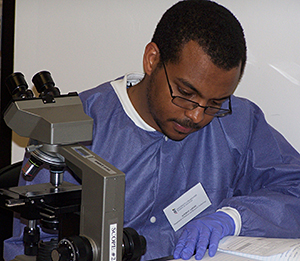Non-Academic Standards/Essential Functions

Non-Academic & Technical Standardsrepresent the essential requirements of the Department of Medical and Research Technology (DMRT) that each student must master to successfully participate in the program and become employable. Each student must be able to carry out the following in a distraction-filled environment:
- Identify visually cellular components, microorganisms and their structure using a clinical grade binocular microscope independently.
- Interpret visually and differentiate colors, shading and intensity on slides, plates, test tubes, printouts, instrument control panels and computer screens.
- Demonstrate sufficient manual dexterity and fine motor coordination to perform manual manipulation of lab equipment, process specimens, operate, maintain, and calibrate laboratory equipment, and carry out all aspects of laboratory testing procedures accurately and efficiently.
- Demonstrate sufficient and adequate strength and mobility to perform basic laboratory functions in an established time-frame according to approved policies and procedures. Includes lifting and carrying 30 lbs, and reaching lab benchtops.
- Demonstrate accurate written, electronic and verbal communication in English to interpret laboratory data, obtain and document relevant information, and comprehend and carryout oral and written instructions and requests.
- Communicate clearly, accurately, effectively and tactfully when transmitting test results and/or information to diverse colleagues, faculty, classmates, physicians and other health care personnel.
- Hear sufficiently to answer phones and beepers, recognize alarms, and respond to questions and receive directions. Use assistive devices (e.g., hearing aids, phone receivers, etc.) if needed.
- Demonstrate professional behaviors including, but not limited to, arriving on-time, teamwork, honesty, accountability and reliability in work, maintaining confidentiality, and adhering to dress code.
A distraction-filled environment refers to each student working efficiently and accurately at school and on rotation placement under the following anticipated conditions:
- Fast paced environment
- Noise filled environment
- Strong chemical or biologic odors
- Repetitive motions
- Standing or sitting for long periods of time
- Interruptions to workflow
- Heavy work-load demands
- Variations in temperatures and humidity
Other Fundamental School and/or Employment Expectations
- Working with bio-hazardous material
- Working with blood and biologic specimens
- Organizing work to perform tasks on time
- Complying with background check & immunization policies
- Adhering to all applicable laboratory policies, procedures and safety standards
- Participating in ongoing training, continuing education and competency checks
- Being flexible and adapting to changes in policy, workflow and schedule
- Adhering to the institution’s policies that do not allow unauthorized operation of personal electronic devices.
- Working in a customer and patient-oriented service environment
- Maintaining composure and focus even during stressful situations
- Reading and understanding relevant professional and technical publications and documents.
